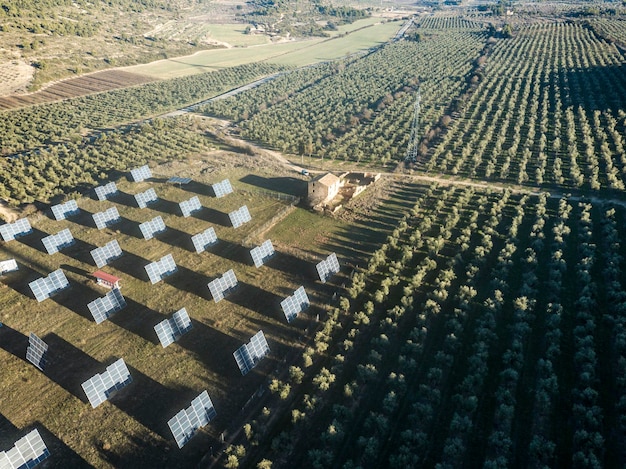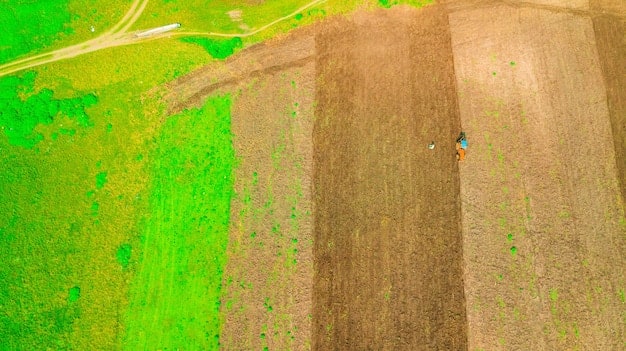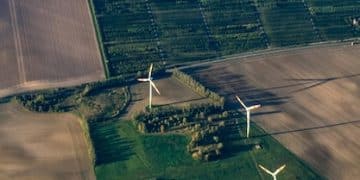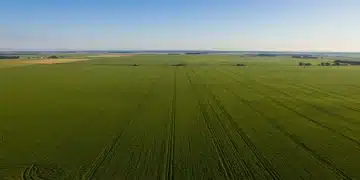Sustainable Agriculture: A Key to Food Security and Climate Change Mitigation

Sustainable agriculture plays a crucial role in mitigating climate change impacts on food security by employing practices that reduce greenhouse gas emissions, enhance soil health, and promote biodiversity, ensuring a more resilient and sustainable food system.
As climate change intensifies, the stability of our global food supply is increasingly threatened. Explore the Role of Sustainable Agriculture in Mitigating Climate Change Impacts on Food Security, understanding how it can provide a crucial solution.
Understanding Sustainable Agriculture
Sustainable agriculture focuses on farming practices that are environmentally sound, economically viable, and socially equitable. It aims to meet the food and fiber needs of the present without compromising the ability of future generations to meet their own needs.
By adopting sustainable practices, farmers can reduce their reliance on external inputs, such as synthetic fertilizers and pesticides, and enhance the natural resources they depend on, promoting a more resilient and productive agricultural system.

Key Principles of Sustainable Agriculture
Sustainable agriculture is guided by several key principles that aim to balance environmental, economic, and social considerations. These principles include:
- Ecological Health: Promoting farming practices that protect and enhance natural ecosystems, conserve biodiversity, and minimize pollution.
- Economic Viability: Ensuring that farming operations are profitable and can provide a stable income for farmers and their communities.
- Social Equity: Supporting fair labor practices, community development, and access to healthy food for all members of society.
- Resource Efficiency: Minimizing the use of non-renewable resources, such as fossil fuels and synthetic fertilizers, and maximizing the use of renewable resources, such as solar energy and organic matter.
These principles work together to create a more sustainable and resilient agricultural system that can withstand the challenges of climate change and other environmental pressures.
In conclusion, understanding the core principles of sustainable agriculture is essential for creating farming systems that are both environmentally sound and economically viable. These principles support a holistic approach to agriculture, ensuring long-term food security.
Climate Change and Its Impact on Food Security
Climate change poses a significant threat to food security around the world, with rising temperatures, changing precipitation patterns, and increased frequency of extreme weather events impacting crop yields, livestock production, and fisheries.
These impacts can lead to reduced food availability, increased food prices, and heightened food insecurity, particularly in vulnerable regions that are heavily reliant on agriculture.
Specific Climate Change Impacts on Agriculture
Climate change affects agriculture in several ways, including:
- Rising Temperatures: Higher temperatures can reduce crop yields, increase water stress, and promote the spread of pests and diseases.
- Changing Precipitation Patterns: Shifts in rainfall patterns can lead to droughts, floods, and unpredictable water availability, impacting crop production and irrigation systems.
- Extreme Weather Events: More frequent and intense heatwaves, droughts, floods, and storms can cause widespread crop damage, livestock losses, and disruptions to food supply chains.
- Sea Level Rise: Rising sea levels can inundate coastal agricultural lands, contaminate freshwater resources with saltwater, and displace farming communities.
Addressing these challenges requires a comprehensive approach that integrates climate change adaptation and mitigation strategies into agricultural practices, enhancing the resilience of food systems and protecting vulnerable populations.
In summary, climate change profoundly impacts food security by disrupting agricultural practices and reducing crop yields. Finding ways to combat these impacts is crucial for ensuring global food stability.
Sustainable Practices for Climate Change Mitigation
Sustainable agriculture offers a range of practices that can help mitigate climate change by reducing greenhouse gas emissions, sequestering carbon in soils, and enhancing the resilience of agricultural systems.
These practices include conservation tillage, cover cropping, crop rotation, agroforestry, and improved livestock management, all of which contribute to a more sustainable and climate-friendly agricultural sector.

Examples of Mitigation Practices
Several sustainable agricultural practices are known for their effectiveness in mitigating climate change. Some prominent examples include:
- Conservation Tillage: Minimizing soil disturbance through reduced tillage or no-till farming can help sequester carbon in soils, reduce soil erosion, and improve water infiltration.
- Cover Cropping: Planting cover crops during fallow periods can prevent soil erosion, improve soil health, and sequester carbon in biomass and soil organic matter.
- Crop Rotation: Rotating different crops in a sequence can enhance soil fertility, reduce pest and disease pressure, and improve carbon sequestration.
- Agroforestry: Integrating trees and shrubs into agricultural systems can provide shade, protect soil from erosion, sequester carbon, and diversify farm income.
By implementing these practices, farmers can reduce their greenhouse gas emissions, improve soil health, and enhance the resilience of their operations to climate change impacts.
In conclusion, adopting sustainable practices is vital for mitigating climate change in agriculture. These practices not only reduce emissions but also improve farm resilience and productivity.
Enhancing Food Security Through Sustainable Agriculture
Sustainable agriculture plays a critical role in enhancing food security by improving crop yields, increasing resilience to climate change, and promoting diversified farming systems.
By adopting sustainable practices, farmers can produce more food with fewer resources, reduce their vulnerability to climate-related shocks, and contribute to a more stable and equitable food supply.
Strategies to Improve Food Security
There are several strategies that can be implemented to enhance food security through sustainable agriculture:
- Improved Water Management: Implementing efficient irrigation techniques, such as drip irrigation and water harvesting, can conserve water resources and ensure reliable water supply for crops.
- Diversified Farming Systems: Integrating a variety of crops and livestock into farming systems can increase resilience to pests and diseases, improve soil health, and diversify farm income.
- Agroecological Approaches: Adopting agroecological principles, such as integrated pest management and nutrient cycling, can reduce reliance on external inputs and promote a more balanced and self-regulating ecosystem.
- Local and Regional Food Systems: Supporting local and regional food systems can reduce transportation emissions, enhance food access for local communities, and support local farmers.
These strategies can help to create more resilient and sustainable food systems that are better equipped to meet the challenges of climate change and ensure food security for all.
In summary, sustainable agriculture is essential for enhancing food security by improving crop yields and building resilience to climate change. Implementing diversified and efficient farming systems is key to achieving this goal.
Policy and Economic Incentives for Sustainable Agriculture
Government policies and economic incentives can play a crucial role in promoting the adoption of sustainable agricultural practices by providing financial support, technical assistance, and regulatory frameworks that support sustainable farming.
Incentives such as subsidies, tax credits, and payments for ecosystem services can help to offset the costs of transitioning to sustainable practices and reward farmers for their environmental stewardship.
The Role of Policies and Incentives
Effective policies and economic incentives can encourage the widespread adoption of sustainable agriculture by:
- Providing Financial Support: Subsidies and grants can help farmers invest in sustainable technologies and practices, such as conservation tillage equipment, cover crop seeds, and water-efficient irrigation systems.
- Offering Technical Assistance: Extension services and technical assistance programs can provide farmers with the knowledge and skills they need to implement sustainable practices effectively.
- Establishing Regulatory Frameworks: Regulations that limit the use of synthetic pesticides and fertilizers, promote soil conservation, and protect water resources can encourage the adoption of sustainable practices.
- Rewarding Ecosystem Services: Payments for ecosystem services can compensate farmers for the environmental benefits they provide, such as carbon sequestration, water purification, and biodiversity conservation.
By creating a supportive policy and economic environment, governments can help to transform the agricultural sector into a more sustainable and climate-friendly industry.
In conclusion, policy and economic incentives are vital for promoting sustainable agriculture. These tools can help farmers adopt environmentally friendly practices and ensure long-term food security.
The Future of Sustainable Agriculture and Food Security
The future of sustainable agriculture and food security depends on continued innovation, collaboration, and investment in research, technology, and education.
As the global population grows and climate change intensifies, it is essential to develop and scale up sustainable agricultural practices that can meet the increasing demand for food while minimizing environmental impacts and enhancing resilience.
Innovations and Technologies for the Future
Several innovations and technologies hold promise for the future of sustainable agriculture and food
- Precision Agriculture: Using sensors, drones, and data analytics to optimize inputs, such as water, fertilizer, and pesticides, can reduce waste and improve efficiency.
- Vertical Farming: Growing crops in stacked layers in controlled environments can increase yields, reduce water use, and minimize land requirements.
- Biotechnology: Developing crops that are drought-resistant, pest-resistant, and nutrient-efficient can enhance productivity and reduce the need for external inputs.
- Regenerative Agriculture: Adopting regenerative practices, such as no-till farming, cover cropping, and rotational grazing, can improve soil health, sequester carbon, and enhance biodiversity.
By embracing these innovations and technologies, farmers can create more sustainable and resilient food systems that are better equipped to meet the challenges of the future.
In summary, the future of sustainable agriculture relies on innovation and investment in technology. By continuing to develop and implement efficient farming techniques, we can ensure food security and environmental sustainability for future generations.
| Key Aspect | Brief Description |
|---|---|
| 🌱 Sustainable Practices | Includes conservation tillage, cover cropping, and crop rotation. |
| 💧 Water Management | Efficient irrigation reduces water waste and improves crop yield. |
| 🔬 Innovations | Precision agriculture, vertical farming, and biotechnology can improve efficiency. |
| 🌍 Policy Support | Government policies and incentives can promote sustainable farming practices. |
Frequently Asked Questions
▼
Sustainable agriculture is a farming approach that focuses on producing food in an environmentally and economically sound manner, ensuring resources are available for future generations.
▼
Sustainable practices reduce greenhouse gas emissions, enhance carbon sequestration in soils and biomass, and decrease reliance on energy-intensive inputs like synthetic fertilizers.
▼
Key practices include conservation tillage, crop rotation, cover cropping, agroforestry, and integrated pest management, all aimed at improving resource use efficiency and ecosystem health.
▼
Governments can offer financial incentives, technical assistance, and regulatory frameworks that promote sustainable farming practices, helping farmers transition to more environmentally friendly systems.
▼
Technologies like precision agriculture, vertical farming, and biotechnology can optimize inputs, increase yields, and enhance the resilience of agricultural systems to ensure future food security.
Conclusion
In conclusion, integrating sustainable agricultural practices is essential for mitigating the impacts of climate change on food security. These methods not only reduce greenhouse gas emissions but also enhance the resilience and productivity of farming systems, ensuring a stable and equitable food supply for future generations.





